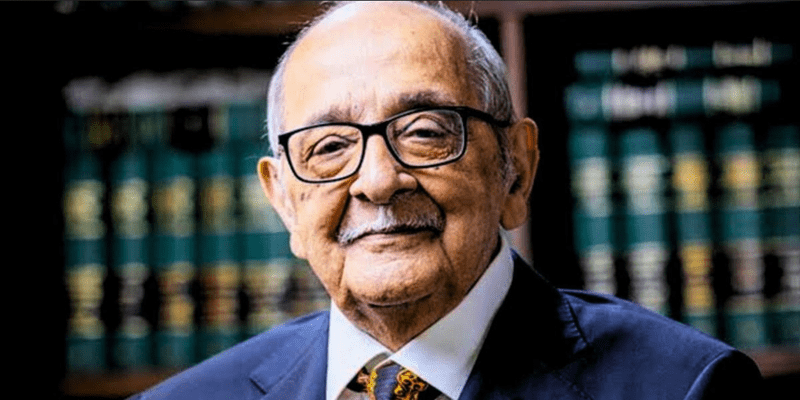He was a liberal in the constitutional sense of the word, defending the fundamental rights of citizens against an overbearing state.
Fali Nariman (1929-2024). Photo: X/@RahulGandhi
Article by Indrani Jaising | The Wire
Fali Nariman is no more and the legal profession will never be the same again.
While there is no need to fear change, a part of our living history is lost. This is a very important part, which began before the constitution came into force and which continues today.
Fali Nariman was a man who saw the making and unmaking of the constitution. Acutely conscious of an attack on secular values he spoke up defending his liberal values and continued doing so, almost till his last days.
He was a liberal in the constitutional sense of the word, defending the fundamental rights of citizens against an overbearing state.
Belonging as he did to a minority community, he was also aware of the constitutional commitment to minorities in this country, a country which gave him the opportunity to rise to the top of his profession and to serve it in turn. He was shaped by the city of Bombay, now Mumbai, which enabled him to represent big businesses and master commercial law.
His commitment to democracy was obvious when he resigned as Solicitor General of India in 1975 upon the declaration of the Emergency.
The legal profession owes him a lot, but primarily the fact that he fought for and sought the collegium system of appointing judges.
He, during his lifetime, challenged every law which attempted to give governments the dominant voice or the last word in appointing judges to the Supreme Court and high courts.
He stood by a commitment to the separation of powers between the executive and the judiciary.
The big question is, will generations that follow – particularly the young lawyers of today – be able to ensure this separation of the domain of justice from the domain of partisan politics?
If he leaves a legacy, it is this: without independence of the judiciary from the executive of the day, the constitution will be reduced to nothing more than a piece of paper.
Loud and aggressive in his advocacy of a case or a cause, Fali Nariman saw this country change from a colony to an independent state. He also saw it through the Emergency of 1975 and watched it arrive at this post-2014 state, which calls into question the basic features of the constitution and where India is described as a ‘temple’.
Fali Nariman did what one individual could do in a lifetime and more, leaving behind a challenge for the lawyers of today to carry the defence of the constitution forward. At a time when the battles of the future will be in the courts, we will miss him.
Indira Jaising is a noted human rights lawyer and a senior advocate at the Supreme Court of India.

